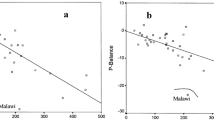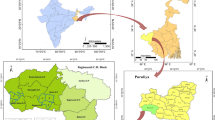Abstract
Livelihood sustainability has been a major concern for many developing economies across the globe. In Ghana, studies have identified climate change as one constraining player that trigger sustainable livelihood. In the Wa West District of Ghana, studies have paid much efforts on climate change and its perceived effects on livelihood with little attention on climate variability which is a yearly phenomenon. The study aimed to investigate climate variability and rural livelihood sustainability using communities along the Black Volta River in the Wa West District in the Upper West Region as units of analysis. The study employed cross-sectional survey using a mixed method approach to investigate the phenomenon. Purposive and simple random sampling methods were used to select the communities and household heads for the study respectively. Questionnaires and interviews were used as data collections tools and questionnaires were administered to 163 household heads. Descriptive and thematic analytical approaches were employed. The result of the study revealed that respondents of the four communities were engaged in primary (crop farming, animal rearing, shea butter processing and Pito brewing) and secondary livelihood activities (dry season gardening, weaving of birds/fishing nets and hair dressing). Evidently, the study found that short, unstable, drought spelt, warm/extreme weather have affected respondents livelihood especially the primary livelihood strategies. In addition, respondents observed drought, flood, poverty/famine, pest and disease, poor crop yield and bush fires as major climate variability-induced shocks and stresses they experienced over the last one decade. Importantly, the study found that respondents have employed cultivation of short duration crop varieties, shifting of planting dates when bad season is suspected and addition of alternative livelihood as response strategies to climate variability. The practical and policy considerations of the study are discussed.



Similar content being viewed by others
References
Acharya, S. S. (2006). Sustainable agriculture and rural Livelihoods. Agricultural Economics Research Review, 19(2), 205–217.
Agrawal, A., & Perrin, N. (2008). Climate adaptation, local institutions and rural livelihoods. In Adapting to climate change: Thresholds, values, governance (pp. 350–367).
Aniah, P., Augustine, Y., & Abindaw, B. A. (2014). Impact of climate variability on smallholder households and indigenous coping strategies in bongo district. International Journal of Development Research, 4(3), 693–699.
Antwi, E. K., Boakye-Danquah, J., Owusu, A. B., Loh, S. K., Mensah, R., Boafo, Y. A., et al. (2014). Community vulnerability assessment index for flood prone savannah agro-ecological zone: A case study of Wa West District, Ghana. Journal of Weather and Climate Extremes, 10(2015), 56–69.
Asante, F. A., & Amuakwa-Mensah, F. (2014). Climate change and variability in Ghana: Stocktaking (pp. 78–99). Retrieved from September 4, 2016 www.mdpi.com/journal/climate.
Attride-Stirling, J. (2001). Thematic networks: An analytic tool for qualitative research. Qualitative Research, 1(3), 385–455.
Ayal, D. Y., & Leal, W. (2017). Farmers’ perceptions of climate variability and its adverse impacts on crop and livestock production in Ethiopia. Journal of Arid Environments, 140, 20–28. https://doi.org/10.1016/j.jaridenv.2017.01.007
Ayers, J. M., & Huq, S. (2009). Supporting adaptation to climate change: What role for official development assistance. Development Policy Review, 1(6), 675–692.
Berg, B. L. (2007). A dramaturgical look at interviewing. Qualitative research methods for the social sciences, 6.
Berkes, F., & Jolly, D. (2001). Adapting to climate change: Social-ecological resilience in Canadian Western Arctic community. Conservation Ecology, 5(2), 23–31.
Boko, M., Niang, I., Nyong, A., Vogel, C., Githeko, A., & Medany, M. (2007). Africa and climate change. In M. L. Parry, O. F. Canziani, J. P. Palutikof, P. J. van der Linden, & C. E. Hanson (Eds.), Climate Change 2007: Impacts, adaptation and vulnerability. Contribution of working group II to the fourth assessment report of the intergovernmental panel on climate change. Cambridge: Cambridge University Press.
Boyd, E., Grist, N., Juhola, S., & Nelson, V. (2009). Exploring development futures in a changing climate: frontiers for development policy and practice. Development Policy Review, 27(6), 659–674.
Braun, V., & Clarke, V. (2006). Using thematic analysis in psychology. Journal of Qualitative Research in Psychology, 3 (2), 77–101.
Cameron, C. (2011). Climate change financing and aid effectiveness: Ghana case study, Vol. 7, 2011, http://www.agulhas.co.uk.
Carney, D. (1998). Approaches to sustainable livelihoods for the rural poor (p. 32). ODI Poverty Briefing, Brighton: Overseas Development Institute.
Chambers, R. (1995). Poverty and livelihoods: Whose reality counts? Environment and Urbanization, 7(1), 173–204.
Chambers, R., & Conway, G. (1992). Sustainable rural livelihoods: Practical concepts for the 21st century. Institute of Development Studies (UK).
Codjoe, S. N., & Owusu, G. (2011). Climate change/variability and food systems: Evidence from the Afram Plains, Ghana. Journal of Regional Environmental Change, 11(4), 753–765.
Creswell, J. W., & Clark, V. L. P. (2007). Designing and conducting mixed methods research. Thousand Oaks, CA: Sage.
Dayour, F., Yendaw, E., & Jasaw, G. S. (2014). Local residents’ perception and adaptation/coping to climate-induced disasters in Bankpama, Wa West District, Ghana. International Journal of Development and Sustainability, 12(24), 2186–2205.
Dube, T., & Phiri, K. (2013). Rural livelihoods under stress: The impact of climate change on livelihoods in South Western Zimbabwe. American International Journal of Contemporary Research, 3(5), 11–25.
Egyir, I. S., Owusu, K., Jatoe, J.-B. D., & Wrigley-Asante, C. (2014). Climate change and agricultural adaptation measures in the transition zone of Mid-Ghana. Journal of Agricultural Research, 2(3), 23–66.
Ellis, F. (1998). Household strategies and rural livelihood diversification. The Journal of Development Studies, 35(1), 1–38.
Ellis, F. (2000). Rural livelihoods and diversity in developing countries. Oxford: Oxford University Press.
Ellis, F., & Mdoe, N. (2003). Livelihoods and rural poverty reduction in Tanzania. World Development, 31(8), 1367–1384.
Environmental Protection Agency. (2008). Ghana climate change impacts, vulnerability and adaptation assessment under the Netherlands climate change assistance programme. Accra: The Technical Summary for Policy Makers.
Farrington, J., Carney, D., Ashley, C., & Turton, C. (1999). Sustainable livelihoods in practice: Early applications of concepts in rural areas. London: Overses Development Institute.
Food and Agricultural Organization. (2008). Climate change and food security: A framework document. Rome: Food and Agriculture Organization of the United Nations.
IFAD. (2001). Rural poverty report 2001: The challenge of ending rural poverty. Oxford: Oxford University Press for IFAD.
IPCC. (2012, November). Climate change: Synthesis report summary for policymakers. Workgroup contribution to the fourth assessment report at IPCC plenary, XXVII (pp. 12–17).
Johnson, R., & Onwuegbuzie, A. (2004). Mixed methods research: A research paradigm whose time has come. Educational Researcher, 33(7), 14–26.
Kangalawe, R. Y., & Lyimo, J. G. (2013). Climate change, adaptive strategies and rural livelihoods in semiarid Tanzania. Natural Resources, 4(3), 266–278.
Kusakari, Y., Asubonteng, K. O., Jasaw, G. S., Dayour, F., Dzivenu, T., Lolig, V., et al. (2014). Farmer-perceived effects of climate change on livelihoods in Wa West District, Upper West Region of Ghana. Journal of Disaster Research, 9(4), 516–528.
Lyimo, J. G., & Kangalawe, R. Y. (2010). Vulnerability and adaptive strategies to the impact of climate change and variability. The case of rural households in semiarid Tanzania. Environmental Economics, 1(2), 88–96.
McSweeney, C., New, M. M., & Lizcano, G. (2012). United Nations Development Program (UNDP) Climate Change Country Profiles. Accra, Ghana. http://country-profiles.geog.ox.ac.uk, 2(24), 34–67.
Mertz, O., Mbow, C., Reenberg, A., & Diouf, A. (2009). Farmers’ perceptions of climate change and agricultural adaptation strategies in rural Sahel. Environmental Management, 43(5), 804–816.
Ministry of Environment, Science and Technology [MEST]. (2013). Ghana third communication to the United Nations. Accra: MEST.
Ministry of Environment, Science, Technology and Innovation, Republic of Ghana. (2013). Ghana climate change policy. Accra: MESTI.
Morgan, D. L. (2007). Paradigms lost and pragmatism regained: Methodological implications of combining qualitative and quantitative methods. Journal of Mixed Methods Research, 1(1), 48–76.
Morton, J. F. (2007). The impact of climate change on smallholder and subsistence agriculture. Proceedings of the National Academy of Sciences of the United States of America, 104(50), 19680–19685.
Ndamani, F., & Watanabe, T. (2015). Farmers’ perceptions about adaptation practices to climate change and barriers to adaptation: A micro-level study in Ghana (pp. 4593–4604). Retrieved from May 30, 2016 www.mdpi.com/journal/water.
Onwuegbuzie, A. J., & Johnson, R. B. (2006). The validity issue in mixed research. Research in the Schools, 13(1), 48–63.
Paavola, J. (2008). Livelihoods, vulnerability and adaptation to climate change in Morogoro. Tanzania. Environmental Science & Policy, 11(7), 642–654.
Rugg, G., & Petre, M. (2007). A gentle guide to research methods. California: Sage.
Scoones, I. (1998). Sustainable rural livelihoods: A framework for analysis. International Forestry Resources and Institutions Program (IFRI) working paper# W08I-6 350-367. IFRI: Michigan-USA.
Slovic, P. (1992). Perception of risks. In P. Slovic (Ed.), The perception of risks (pp. 390–412). London: Earthscan Publication Limited.
Stanturf, A. J., Warren, L. M., Charnley, S., Polasky, C., Goodrick, S. L., Armah, F., et al. (2011). Ghana climate change vulnerability and adaptation assessment. A USDA Forest Service international program report produced for review by the United States Agency for International Development (USAID), Accra, Ghana.
Teddlie, C., & Yu, F. (2007). Mixed methods sampling a typology with examples. Journal of mixed methods research, 1(1), 77–100.
Tejada, J. J., & Punzalan, J. R. B. (2012). On the misuse of Slovin’s formula. The Philippine Statistician, 61(1), 129–136.
Wa West District Assembly [WWDA]. (2007). Wa West District Medium-Term Development Plan 2006-2009. Wechiau: WWDA.
World Bank. (2012). The World Bank climate Change knowledge portal. http://sdwebx.worldbank.org/climateportal/index.cfm. Page=country historical climate and this region=Africa and ThisCCode=GHA.
Yiridomoh, Y. G., Appiah, D. O., & Owusu, V. (2018). Women smallholder farmers’ adaptation to climate variability derivatives in savanna ecological zone, Ghana. In J. Nagao, J. Masinja, & A. Alhassan (Eds.), Sustainable development in Africa (pp. 93–120). USA: Spears Media Press LLC.
Ziervogel, G., & Calder, R. (2003). Climate variability and rural livelihoods: Assessing the impact of seasonal climate forecasts in lesotho. Area, 35(4), 403–417.
Acknowledgements
We acknowledged all the household heads of the four communities and the research field assistants.
Author information
Authors and Affiliations
Corresponding author
Ethics declarations
Conflict of interest
The authors declared that they have no conflict of interest.
Additional information
Publisher's Note
Springer Nature remains neutral with regard to jurisdictional claims in published maps and institutional affiliations.
Rights and permissions
About this article
Cite this article
Yiridomoh, G.Y., Sullo, C. & Bonye, S.Z. Climate variability and rural livelihood sustainability: evidence from communities along the Black Volta River in Ghana. GeoJournal 86, 1527–1543 (2021). https://doi.org/10.1007/s10708-020-10144-0
Published:
Issue Date:
DOI: https://doi.org/10.1007/s10708-020-10144-0




